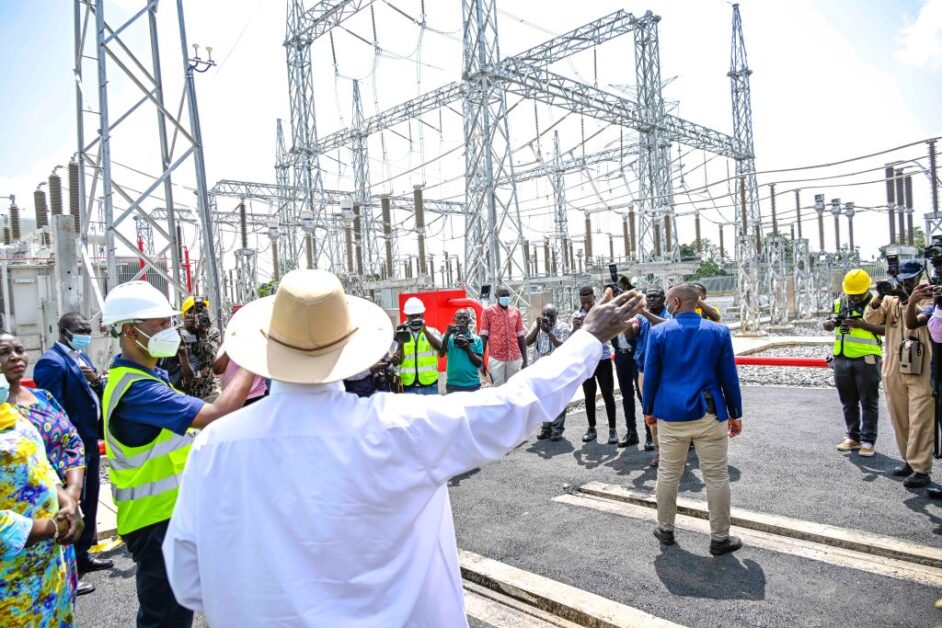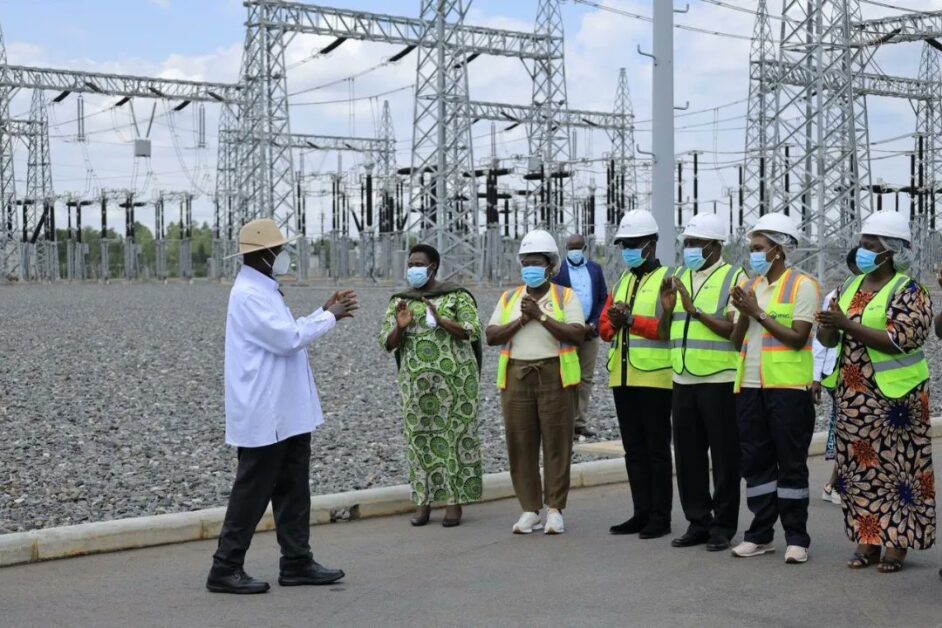Joshua Karamagi was appointed Chief Executive Officer of Uganda Electricity Transmission Company Limited (UETCL) in March 2023, at the most unusual of times.
He joined the government-owned electricity transmission company following the Board’s firing of the top leadership in August 2022. The Board that appointed him itself, was new since the Ministry of Finance, Planning & Economic Development (MoPED) fired the entire old board in April of the same year.
The new board was led by Kwame Ejalu Ejuku, a respected and no-nonsense Ugandan entrepreneur and businessman in the non-banking financial sector.
Over and above having to build a new exco team, Joshua too inherited several legacy and reputation-damaging challenges, such as corruption and a backlog of delayed projects- some by over 5 years. One such delayed project was the 83 km Gulu-Agago 132 kV line meant to evacuate power from the Agago/Achwa 83MW Hydropower Plant. Because of the delays in constructing the line, the government was paying USD2.5 million for generated power that was not being used because of no transmission line.
The other challenge was a backlog of land titles. Usually, UETCL acquires land for its transmission lines, and this requires that UETCL acquire land titles for this land from the project-affected persons. This involves getting the original titles from the PAPs, then cutting off (mutating), titling and transferring ownership of the land into its names. Upon completing this, the original titles have to be handed over to their original owners.
While Section 2.1 of the Ministry of Lands, Housing and Urban Development Clients’ Charter 2017/18 – 2020/21 stipulates that the Department of Surveys and Mapping shall approve a subdivision/mutation of land within seven working days, the Auditor General, for example in his FY2021/22 report found that on average this process was taking up to 25 months to conclude. There were, however, some unresolved cases as old as 10 years. As a result, by the time Joshua joined UETCL, there were approximately 1,500 case backlogs.
The net effect of all these was a negative toll on staff morale as well as constant negative media reporting that had damaged the reputation of the organisation.

One of the very first things Joshua did was to carry out a staff rationalisation exercise. Staff Rationalisation is the process of evaluating and adjusting the size, composition, and roles of an organisation’s workforce to improve efficiency, reduce costs, or optimise operations. It is typically driven by the need to align staff numbers and roles with the company’s current needs, strategic goals, and overall business environment.
“I found disengaged staff, not motivated, with so many negative stories in the media. And on top of that, it appeared like people out there didn’t know so much about UETCL. They could not differentiate between UETCL, Umeme and the other players in the sector,” Joshua told journalists at a recent end-of-year media dinner.
“So as a new CEO, I asked myself, what should be my immediate assignment about all the instability that was going on and the position where UETCL sat? I then decided that as a new CEO, my immediate assignment was to try and put UETCL on a transformation and turnaround path,” Joshua explains.
“Having decided on that. The next question was, how was this going to happen? I thought there were two main areas, at the minimum, of course, because there were so many things that we needed to do, but at the minimum, I needed to ensure that we have the right motivated and engaged staff, with the right performance and accountability culture,” he adds.
Following the operationalising of a new organisational structure and staff rationalisation, 70 staff were retired. In addition, 33 high-calibre staff were competitively recruited to fill key top positions. As part of the new structure, the contracts of the remaining staff were reviewed and renewed.
“With the right people, the second thing that I thought we needed to do to put us on that transformation and turnaround path, was to inculcate in them a new performance culture and ask them to be more accountable.”
To align all staff around the new performance and accountability culture, UETCL also changed its war cry (tagline)- from “Transmitting Power for Development” to Transmitting for Transformation”.

To complete the war plan, UETCL also needed a matching corporate strategy⏤ the one that Joshua inherited was expiring at the end of June 2023. The organisation had in fact kickstarted a process to procure an external consultant to design the strategy, but Joshua believed to have maximum team ownership of the strategy, it had to be developed in-house- so he cancelled the procurement process and one strategy developed in-house.
The 2024-2029 Corporate Strategic Plan has since been approved by the Board and the shareholders- the Ministry of Finance Planning and Economic Development (MoFPED), as well as the Ministry of Energy and Minerals Development (MEMD).
The new strategy is built on 8 pillars, namely”
- Enhancing innovation and creativity
- Improve quality of work-life
- Strengthening governance and compliance
- Strengthening stakeholder engagement and collaboration
- Increasing stakeholder satisfaction
- Strengthening the transmission grid
- Improving operational efficiency
- Strengthening financial performance
As part of the new strategy, UETCL is planning to achieve a Stakeholder Satisfaction Index of at least 90% and a Workforce Engagement Index of at least 80% by June 2029 This, among others, shall be achieved by ensuring grid availability of at least 98% attained annually, reducing transmission losses from 4.8% in 2024 to 4% by June 2029 and increasing transformation from 6,605.5 MVA in 2024 to 14,325 MVA by June 2029. UETCL also plans to increase the total number of switching/substations from 35 in 2024 to 68 by 2029 and increasing transmission line coverage length from 4,517.4 km in 2024 to 12 8,180 km by 2029.
UETCL also plans to attain an average energy sales revenue growth of 9% annually and Non-Energy Sales Growth of at least 3% Annually.
To be able to pull off all the above, UETCL must also achieve a capital budget approval score from 46.2% to 85% by June 2029 as well as pursue additional CAPEX funds of UGX 8,145 billion by June 2029 for the outstanding Grid Development Plan (2018-2040) requirements.

To adhere to internationally recognized standards of quality, safety, and efficiency, UETCL also plans to attain ISO 45001:2018 Certification for Occupational Safety and Health (OSH) by 2026; ISO 27001 Certification for Information Security Management Systems by 2027), and ISO 14001:2015 Certification for Environmental Management Systems and 2029.
This is over and above the ISO 9001:2015 certification that UETCL attained in August 2023. ISO 9001:2015 provides a comprehensive, well-established framework for ensuring high standards of quality throughout project execution and management. By focusing on customer satisfaction, continual improvement, risk management, and effective resource allocation, the standard helps organisations deliver successful projects that meet client expectations and adhere to regulatory requirements. Its principles lead to more structured, efficient, and effective project management, enhancing both the process and the outcome of project implementation.
Clearing project backlogs and delays
One of the overdue projects was the Gulu-Agago 132 kV line and its substations, which was finished and commissioned in December 2023, saving the government a monthly expenditure of USD 2.5 million. But more importantly, the Gulu-Agago 132 kV line directly benefits the people of Gulu, Omoro and Pader Districts by ensuring the supply of reliable and stable power. to these areas” said Joshua Karamagi, CFA – CEO, UETCL.
Another overly delayed project that has been completed is the 132kV Kole-Gulu-Nebbi-Arua transmission line, which will connect the West Nile region to the national transmission grid for the first time. It was completed in September 2024.
“This had been a promise of government to the people of West Nile for so many years. This project had delayed by more than five years,” Joshua notes.

Another completed project is the Karuma Interconnection Project.
“This interconnection project connects the Karuma Power Plant to Kawanda, via a 400kV transmission line; Karuma-Olwiyo via a 400kV transmission line and Karuma-Lira via a 132kV transmission line. We were able to be in time to evacuate the 600 Megawatts of the Karuma Plant, which the President Commissioned in October of this year. This project had also been delayed by more than five years,” Joshua says.
With support from the Japan International Cooperation Agency (JICA), UETCL’s National Control Center in Lugogo was also upgraded with modern technology that enables nationwide monitoring of the national grid.
“From Kampala, we can see what is happening in Arua and all the other parts of the country. That helps us to see where there are faults and to make sure corrections are made on the grid in time,” Joshua reckons.
With more motivated staff, enhanced project completion rates and improved efficiency, the company continues to improve its profitability.
Profit after tax for the year ended June 2023 rose by 152% from UGX37.7 billion to UGX94.9 billion.
UETCL was rated by the Auditor General as the most profitable government enterprise for the FY2022/23.
“In the FY2023/24 which is under audit, we expect to increase our profitability to UGX132 billion,” Joshua says.
Outlook: UETCL is committed to a brighter and more electrified Uganda
UETCL is presently implementing a number of key transmission projects such as the USD100 million phase two electrification of industrial parks and free trade zones project. The goal of this project is to increase the availability and security of quality bulk power supply to support the proposed gazetted Economic Free Trade Zones of Wobulenzi, Kaweeweta, Luweero, Kapeeka, Mbale, Sukulu and Kabaale.
“We just have signed the loans. This project will begin around June next year. It is going to work on the Industrial Parks- Mbale, Kabaale, Kapeeka and so many others”
The USD100 million Kampala Metropolitan Improvement Project that will improve the connectivity around Kampala, and refurbish the old infrastructure is already ongoing and will be completed in 2026.
UETCL is also currently undertaking feasibility studies to implement a USD 120 million project to supply power to the Standard Gauge Railway project. The contract for the USD3 billion, 272 km rail project was signed between the government of Uganda and Yapi Merkezi, a Turkish Construction firm.

UETCL is also a member of the Eastern Africa Power Pool (EAPP), a regional initiative to carry out cross-border power trade and grid interconnection among 13 Eastern Africa countries. The countries are: Burundi, Djibouti, Democratic Republic of Congo (DRC), Rwanda, Egypt, Ethiopia, Kenya, Sudan, Tanzania, Uganda, Libya, South Sudan and Somalia. As part of getting ready for the power trading, which commences mid-2025, UETCL is also undertaking feasibility studies for the Masaka-Mutukula- Tanzania; Olwiyo-Nimule-South Sudan and the Uganda-DRC interconnection projects.
“All these are necessary because we are participating in the East African Power Pool for which the trading is going to begin next year. Without these interconnections, it doesn’t mean much for us to be a member of the East African Power Pool,” Joshua notes.
To improve the work environment as well as cater for anticipated growth, UETCL, in June 2023, commissioned work on a new headquarters building.
“The new building is already under construction at a cost of UGX 170 billion. The structure has come out of the foundation and is now on the fifth floor. It’s going to be ten stories, and it will be completed in 2026,” Joshua concludes.
About Joshua Karamagi
Joshua is an accomplished finance professional and business leader with over 28 years of finance, 10 of them in the energy industry. He wields extensive experience in energy infrastructure finance and investments, capital project analysis, cost improvement and strategic business plan development.
Joshua is a CFA charter holder. He also holds an MBA from Edinburgh Business School, Herriot-Watt University and is a certified public accountant. He also holds a B. Com (Honours) degree from Makerere University.
In 2018, he was recognized by Deloitte Uganda and ACCA Uganda, as the best-performing CFO in the public sector.
This year, Joshua was also recognised by CEO East Africa Magazine readers as one of 100 Leading & Most Admired CEOs in Uganda for 2024. UETCL was also recognised amongst Uganda’s 100 Most Trusted and Respected Companies Survey in our groundbreaking 2-in-1 Most Trusted and Respected Companies and the Leading and Most Admired CEOs in Uganda Survey 2024.

Joshua, in March 2023 joined UETCL from the Uganda Electricity Generation Company Ltd (UEGCL), where was the Chief Financial Officer since 2015.
As CFO of Uganda Electricity Generation Company (UEGCL) for the last 8 years, he was among others, part of the key team that developed the 660 megawatts Karuma and 183 megawatts Isimba Hydropower dams. His role involved structuring the financing and negotiating power purchase agreements for the successful construction of the two dams, which are worth over USD 2 billion.
He also participated in the structuring, financing and construction of Nyagak III Power Station, a 6.6-megawatt mini hydroelectric power project. Nyagak III is a Public Private Partnership (PPP) between UEGCL and a consortium consisting of Hydromax Limited and Dott Services Limited for USD25 million.
Karamagi started his finance career at PwC as an Audit Senior and in January 1999, moved to Celtel Uganda (now Airtel Uganda) as a Financial Accountant. In January 2002, he joined AfricaOnline as the Chief Accountant for one year, before joining Uganda Breweries as Chief Accountant. After one year, he joined NSSF Uganda as the Chief Financial Officer for 5 years. In August 2007, he left the Fund and joined the Ministry of Finance, Planning and Economic Development (MoFPED) as an Assistant Commissioner. After 3 years, he, in November 2010, joined Makerere University as the Financial Director until December 2014, when he joined Uganda Electricity Generation Company Limited as the Chief Finance Officer.

